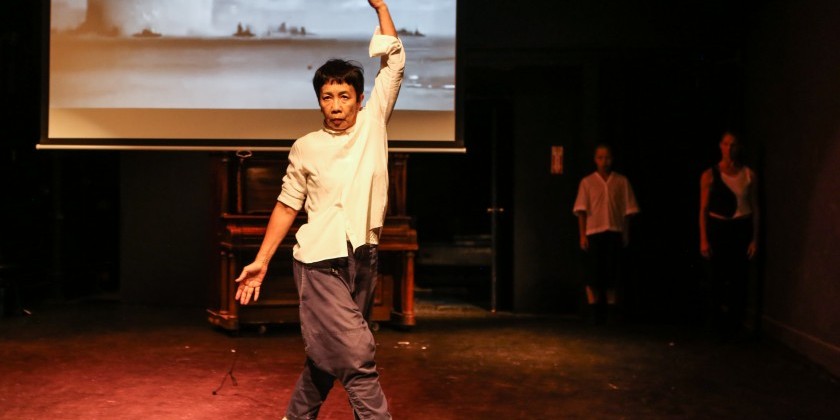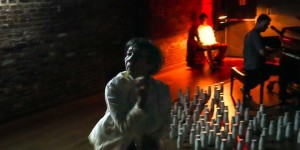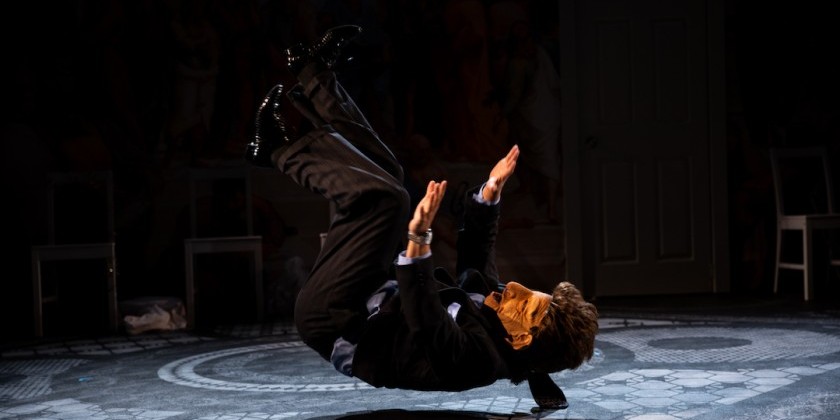THE DANCE ENTHUSIAST ASKS: Yoshiko Chuma and The School of Hard Knock's "Shockwave Delay" at LaMaMa

WHO: Yoshiko Chuma, The School of Hard Knocks
WHAT: Shockwave Delay
WHEN: June 1 - 11, 2023
WHERE: Ellen Stewart Theatre @ LaMaMa, 66 East 4th Street, New York, NY
MORE INFO: CLICK HERE
Yoshiko Chuma and Catherine Tharin of The Dance Enthusiast met at Chuma's apartment, a brightly graffitied store front in the East Village. This month, Chuma and her company, The School of Hard Knocks, will are presenting Shockwave Delay, a work informed and fuelled by political memories and experiences. Below are selective excerpts of a 140-minute stream-of-consciousness interview.
Catherine Tharin for The Dance Enthusiast: Yoshiko, would you say that you’re a relaxed person?
Yoshiko Chuma: I’m always doing something. With tea [alludes to the tea she is serving], you have to wait. I travel all over the world and am in the company of others. I follow their rules and am relaxed. In the blackness of a movie theater, I’m relaxed. But, usually, I’m very focused — often too focused!

You mentioned that you’re hobbled by an inability to learn languages, yet as a person of the world, you communicate and understand others without speaking.
Yoshiko Chuma: Germaine Acogny and I met on Fridays at Noon, 92Y. From Senegal, Germaine speaks Walof and French. I speak Japanese and [less clearly defined] English. Yet, we silently communicated. We developed trust. I invited Germaine and her husband for dinner with me at this table. They stayed for five hours. When I visited them in Senegal, I stayed with them for seven days. Because I trust people, and they trust me, I know thousands all over the world. I ask zero questions. I ask for no translation. English is not an international language but an occupational language.
[Note: Chuma teaches and performs in many countries every year. Germany is a favorite destination where Chuma’s eight films from 1979-82 were recently screened. She also visits unstable countries, such as Afghanistan, Venezuela, and Palestine.]
I communicate with the members of my company, The School of Hard Knocks. One young dancer doesn’t have a phone. Our communication is Instagram. With each dancer I negotiate a way to communicate. Some email, some text. There is a lot of effort to communicate. I’m close friends with many dancers.
I don’t write anymore in Japanese, but I read very fast. I hear. I observe. An audience only sees and hears once.

Your highly original and personal work layers movement, painting, film, projections, photography, spoken word, design, and sound. Many of the artists on stage are creating in the moment. Your work has the sense of controlled spontaneity. What is the genesis of this work?
Yoshiko Chuma: In 1945 to 1960 US army bases were established on Okinawa. The US needed Okinawa [from which] to bomb Vietnam. I was a student at Tokyo University during the Vietnam War. I organized protests against the war. This was 1969 and students were locked out of the university. My training [as an artist] is the war in Vietnam.
US atomic bombs were dropped on Hiroshima and Nagasaki [Japan]. This act influenced the way I look at the world. What am I saying about the Manhattan Project? The Manhattan Project is behind every project of mine since 1976. Always on my mind is the Manhattan Project. I went to Las Vegas to visit the National Atomic Testing Museum. 1945 Potsdam – Stalin, Churchill, and Truman met. Their one time to meet. [The eventual result was the the Cold War.] I was born in 1950 during the Cold War.
The latest G7 summit [May 2023] was held in Hiroshima [among other cities]. The G7 countries, Canada, France, Germany, Italy, Japan, the UK, and the US, all went to the Hiroshima victim museum [Hiroshima National Peace Memorial Hall for the Atomic Bomb Victims]. I followed the Turkish election. The School of Hard Knocks is informed by what is happening in the world. American democracy is only one way; I still hold a Japanese passport.
I’m not a historian. I’m not talking about this on the stage. I am protesting for human rights. But this [political act] is what I share. I don’t call it dance. I call it Monologues. I belong to dance but am closer to poetry.
What is contemporary dance? Trisha Brown is Trisha Brown, Bebe Miller is Bebe Miller, Yoshiko Chuma is Yoshiko Chuma. I am definitely not Butoh.

In January 2023, you performed a Monologue during the St. Mark’s Poetry Project benefit. The project is an organization with whom you have enjoyed a long and fruitful association.
The clip I watched is of you in a gray, tentlike garment, and hat, huffing into the microphone. You quickly shuffle from one side of the small stage to the other, slashing your arms. Behind you is a projection of moving clouds. The sound of an airplane pushes to the forefront. A man’s voice countdowns the seconds before a bomb is dropped.
Yoshiko Chuma: Always on my mind is the Manhattan Project. I perform the same pieces in big theaters and small. I know many borders. I've performed in 40 different countries. Young poets know me. I have performed at The St. Mark’s Poetry Project for 42 years. I performed a Monologue for seven minutes on the benefit 2023, for 600 young people. I do like those relationships [with poets].
What is your process for bringing the components of your work together?
Yoshiko Chuma: I came here when I was 26 years old in 1976. I'm 70 now. I knew no one and I figured it out. I didn’t dance in Japan. I’ve had no formal dance training. Edwin Denby was my teacher of the dance. The School of Hard Knocks, now 46 years, is very intellectual and spiritual.
I’m more like a composer and a conductor. For Shockwave Delay I’ve written [a score of] 150 pages. I constructed a model set. The work is 2 ½ hours long. Each performer knows where they are each minute. Some of the sections are three minutes of walking. There are more than 30 performers plus a noted guest on each of the nine shows. The guests will perform for five minutes. Each section is very special and detailed. It takes a long time to make a score. I enjoy this. Unfortunately, I have a deadline. Ten days before [a production] I say I wish I had one month. I live my life as a deadline. Each minute of Shockwave — I plan to punch it! That’s my mission.














